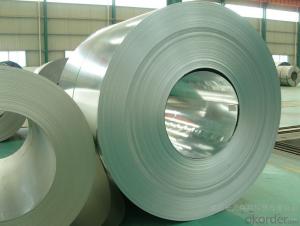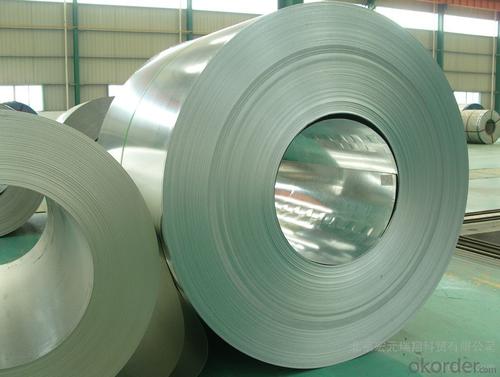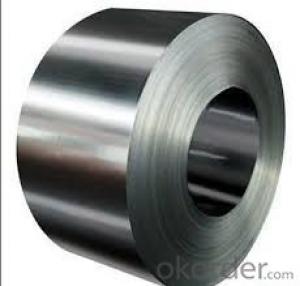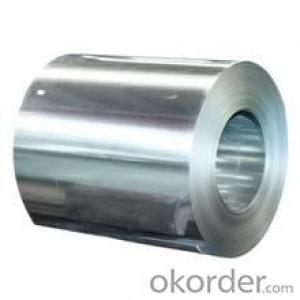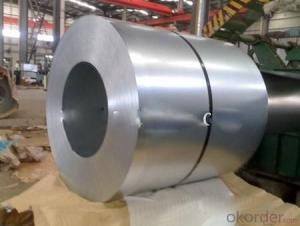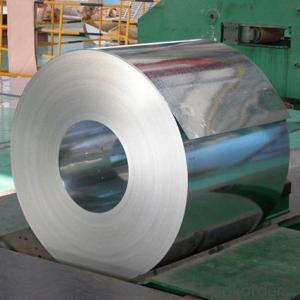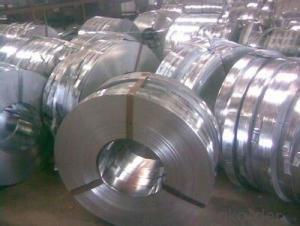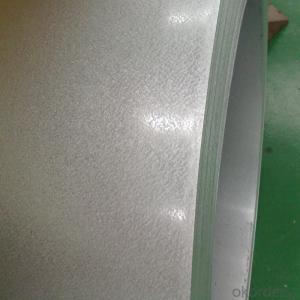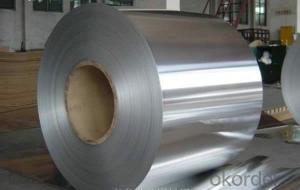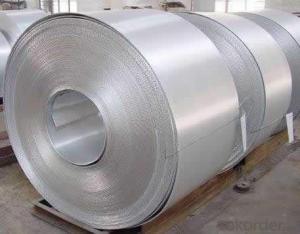Al-Zinc Coated Steel Rolled coil for steel Roofing
- Loading Port:
- Tianjin
- Payment Terms:
- TT OR LC
- Min Order Qty:
- 50 m.t.
- Supply Capability:
- 30000 m.t./month
OKorder Service Pledge
OKorder Financial Service
You Might Also Like
Structure of Al-Zinc coated steel coil
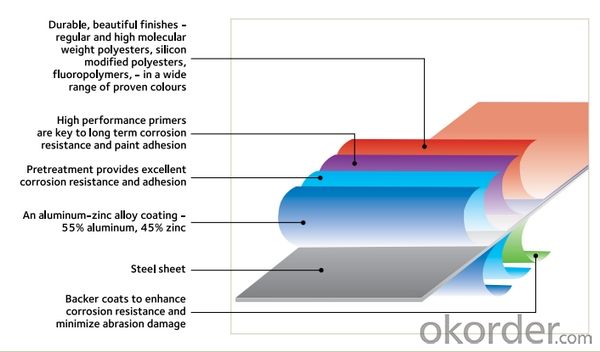
Description of Aluminum Zinc Rolled Coil
Aluminum zinc coils is a kind of coated steel coil/sheet. With the cold rolled steel of different strength and thickness as substrate, it is produced through applying Al-Zn coat on both faces by hot dip process. In its coating, Al accounts for about 55%, Si 1.6%, while the remaining is Zn. Aluminum zinc coils enjoys both the physical protective feature and durability of Al and the electrochemical protective property of Zn. And its surface has bright silver color and regular embossed-like figure, which are highly decorative.
Main Feature of Al-Zinc coated steel coil
1.Corrosion resistance: It mainly depends on the aluminum protection. When the zinc being worn, the aluminum will form a dense layer of aluminum oxide, resist corrosion material to prevent further corrosion inside.
2. Heat resistance: Aluminum zinc alloy steel sheet has excellent heat resistance, can withstand high temperatures over 300 centigrade, and is similar with aluminized steel high temperature oxidation resistance. It often used in chimney pipes, ovens, fluorescent lighting device and the device cover.
3. Heat reflective: Galvanized steel plate heat-reflective high rate is twice as galvanized steel, often used to make insulation materials.
4. Economy: Because density of 55% AL-Zn is smaller than the density of Zn, so in the same weight and thickness of Galvanized zinc layer, aluminum-zinc steel plate is larger area more than 3% of galvanized steel sheet.
Applications of Al-Zinc coated steel coil
1. Construction and building: roofing; ventilating duct; handrail; partition panel;etc.
2. Electric appliance: refrigerator; washing machine; refrigerator; DVD;etc.
3.Transportation: oil tank; road sign; etc.
4.Agriculture:barn; etc.
5.Others:vending machine; game machine; etc.
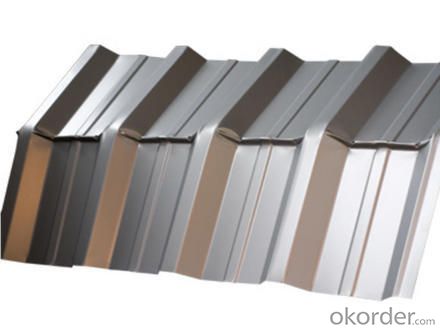
Specifications of Al-Zinc coated steel coil
Prepainted galvanized steel coil ( PPGI ) | Prepainted galvalume steel coil ( PPGL ) | |
Standard | JIS G3312 CGCC | J IS G3322 CGLCC |
Valid thickness | 0. 16 ~1. 2 0mm | 0. 16 ~1. 2 0mm |
Coil width | 600~1250mm | 600~1250mm |
Coil ID | 508mm & 610mm | 508mm & 610mm |
Coil weight | 3~5 tons | 3~5 tons |
Coating | 4 0~275 g/m2 | AZ30 to AZ150 |
Paint t hickness , top side | 15~25 microns | 15~25 microns |
P aint t hickness , reverse | 5~7 microns or 15~25 microns | 5~7 microns or 15~25 microns |
Color | any RAL code | any RAL code |
Package | vertical, eye to sky & horizontal | vertical, eye to sky & horizontal |
MOQ | 25 tons | 25 tons |
FAQ of Al-Zinc coated steel coil
We have organized several common questions for our clients,may help you sincerely:
1. What is the minimum order quantity ?
Our MOQ is 50mt for each size. And we will consider to give more discount if you make big order like 1000 tons and more. Further more, the more appropriate payment term your offer the better price we can provide.
2. How long can we receive the product after purchase?
Usually within thirty working days after receiving buyer’s advance payment or LC. We will arrange the factory manufacturing as soon as possible. The cargo readiness usually takes 15-25 days, but the shipment will depend on the vessel situation.
3. How to guarantee the quality of the products?
We have established the international advanced quality management system,every link from raw material to final product we have strict quality test;We resolutely put an end to unqualified products flowing into the market. At the same time, we will provide necessary follow-up service assurance.
- Q: Hi I was thinking about buying this knife, but i wasn't sure if it was good because it's stainless steel.
- This isn't really a question for this section, but I'm still happy to help out since I'm a big cutlery nerd as well. One thing to look out for when buying a knife is a lack of specifics on what steel is being used. High Carbon Stainless Steel doesn't tell you what the steel is, just what it MIGHT be. Chances are it's something along the lines of 420HC or 440A, both of which are softer steels. They aren't the worst steels around, but they are very quick to dull. You'd be better off looking at the Balisongs of Benchmade. They'll cost more, but you'll know that you're getting something made with quality materials and that won't break on you. And if it does break for some odd reason, Benchmade's warranty and customer service are both fantastic. Although if a more questionable knife is okay with you as long as the price isn't too high, then at least 420HC and 440A aren't too brittle and will take a decent edge even though they'll dull quickly. As for whether stainless steel is good for a knife or not, that depends on the type of stainless steel and what you're going to use the knife for. Many stainless steels are more brittle than a carbon steel, so high carbon stainless steels are a bit more likely to rust but a little tougher as well. In a butterfly knife, a steel like that is a good way to go, although the steels used by Benchmade, as I mentioned, are of a much better quality.
- Q: How are steel coils used in the production of agricultural structures?
- Steel coils are widely used in the production of agricultural structures due to their exceptional strength and durability. These coils, typically made of high-quality steel, are used in various applications throughout the agricultural industry. One of the primary uses of steel coils in agricultural structures is for the construction of buildings and storage facilities. Steel coils are used to create sturdy frameworks, supporting the walls and roof of these structures. The inherent strength of steel allows for the construction of large, open spaces without the need for excessive support columns, providing farmers with ample space to store their crops, machinery, and livestock. Additionally, steel coils are utilized in the manufacturing of agricultural equipment and machinery. Whether it is tractors, plows, harvesters, or irrigation systems, steel coils play a crucial role in the fabrication of these tools. The high tensile strength of steel ensures that these agricultural machines can withstand the demanding conditions of farming, such as heavy loads, rough terrains, and exposure to harsh weather elements. Furthermore, steel coils are also used in the production of fencing and enclosures for agricultural purposes. Whether it is to protect crops from animals or to create boundaries for livestock, steel coils are an essential component in constructing sturdy and reliable fences. The strength of steel ensures that these fences can withstand the pressure from animals, preventing them from breaking through and causing damage to the crops or escaping. In summary, steel coils are integral to the production of agricultural structures and equipment. Their strength, durability, and versatility make them an ideal material for constructing buildings, manufacturing machinery, and creating fences in the agricultural industry.
- Q: Aluminum and Steel brittle or ductile based on these results? and why? Steel Aluminium% Elongation 0.2510.2705Modulus of E in ksi11833.33964.71Tensile Strength (ksi)87.5 51.5Yield Strength (ksi)78.5 41
- Only steel(of this pair)might be liable to brittle fracture,which would be implied by almost zero elongation or reduction in area at fracture.On this basis the steel has not failed by brittle fracture.I would expect much more elongation in pure aluminium than your sample shows so I presume it to be brittle unless it is an alloy rather than commercially pure aluminium.However brittle fracture in metals is a particular phenomenon to be determined by impact tests and examination of fracture surfaces and is particularly relevant to metals with the body centred crystal structure.
- Q: How are steel coils classified based on their thickness?
- Steel coils are classified based on their thickness into different gauge categories. These categories range from thin to thick, with each gauge representing a specific measurement.
- Q: How are steel coils used in the production of steel tanks?
- Steel coils are an essential component in the production of steel tanks. These coils, which are typically made from high-quality steel, serve as the primary raw material for manufacturing steel tanks. The first step in the process is to unroll and flatten the steel coils, which are usually delivered in a coiled form from the steel mills. Once the coils are unrolled, they are then cut into specific lengths and widths, depending on the desired dimensions of the steel tank. These cut pieces are then molded and shaped into the different components of the tank, such as the cylindrical body, the top and bottom ends, and any additional fittings or accessories. The steel coils provide the necessary strength and durability to the tank, ensuring that it can withstand the rigors of its intended application. The quality of the steel used in the coils is crucial, as it determines the tank's resistance to corrosion, pressure, and external forces. Moreover, the use of steel coils allows for efficient and cost-effective production of steel tanks. The standardized nature of the coils ensures consistent quality and dimensions, resulting in a streamlined manufacturing process. The ability to cut the coils into precise lengths and widths also minimizes wastage and maximizes material utilization. Furthermore, steel coils offer flexibility in terms of design and customization. They can be easily formed and welded into complex shapes, allowing for the creation of tanks with varying sizes, capacities, and configurations. This versatility makes steel coils an ideal choice for producing tanks for diverse sectors, including industrial, commercial, and residential applications. In summary, steel coils play a crucial role in the production of steel tanks. They provide the necessary raw material for manufacturing various tank components, ensuring strength, durability, and customization. By utilizing steel coils, manufacturers can efficiently produce high-quality tanks that meet the specific requirements of different industries.
- Q: How are steel coils processed for stamping or forming?
- Steel coils are typically processed for stamping or forming by first uncoiling them and then flattening or leveling them to remove any curvatures or distortions. After that, the coils are fed into a stamping or forming machine, where they undergo different processes such as cutting, bending, or shaping to achieve the desired final product.
- Q: Can steel coils be cut to length?
- Yes, steel coils can be cut to length using various cutting methods such as shearing, slitting, or sawing.
- Q: i currently have just steel guitar strings, not a fan they need replacing and i was wondering whats the difference between steel and bronze strings and or nickle strings?
- That depends a lot on what type of music you want to play. Most of the acoustic guitar music you hear on the radio is steel string. That's the bright, sustaining tone most musicians associate with acoustic guitar. Nylon strings give a more muted, mellower tone. Typically this is used for classical playing, although it has been used in popular music very successfully. (Think of Clapton's Tears In Heaven -- the second, lead guitar is a nylon string.) Many people will tell you that a nylon string guitar will be easier to learn on. This is true, but if you go with a classical guitar, with the wider neck and shorter fretboard, you might find some troubles transitioning to the standard longer narrower acoustic fretboard.
- Q: The difference between aluminized color steel roll and ordinary color steel roll
- Aluminized color coated sheet is a new type of material produced in China in recent years due to its high end applications. It is often used as an indication of CCLI. It is made of galvanized steel sheet (55% aluminum, 43% zinc and 1.6% silicon), which is more galvanized and more corrosion resistant. It is processed by surface degreasing, phosphating and complexing treatment, and is coated with organic coating.
- Q: How are steel coils inspected for edge quality?
- Inspectors use a combination of visual inspection and non-destructive testing methods to assess the edge quality of steel coils. During visual inspection, trained inspectors carefully examine the entire length of the coils to detect visible defects like cracks, chips, or uneven edges. Non-destructive testing methods, including ultrasonic testing and magnetic particle inspection, are also utilized to uncover any hidden defects or imperfections in the edges of the steel coils. Ultrasonic testing employs high-frequency sound waves to identify internal flaws or discontinuities in the steel, while magnetic particle inspection utilizes magnetic fields and particles to detect surface or near-surface defects. Both visual inspection and non-destructive testing methods are vital in guaranteeing the quality of the steel coil edges. Manufacturers can identify and resolve any defects or imperfections by conducting these inspections, thereby ensuring that the coils meet the required quality standards.
Send your message to us
Al-Zinc Coated Steel Rolled coil for steel Roofing
- Loading Port:
- Tianjin
- Payment Terms:
- TT OR LC
- Min Order Qty:
- 50 m.t.
- Supply Capability:
- 30000 m.t./month
OKorder Service Pledge
OKorder Financial Service
Similar products
Hot products
Hot Searches
Related keywords
